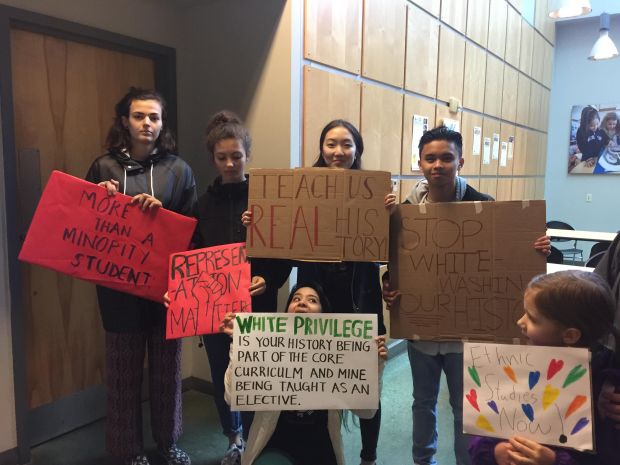Ethnic Studies Now!: Seattle students ask, “Why aren’t we learning this in school?”

From disproportionate discipline rates to its hyper-segregated schools, Seattle is a tough place to be for students of color. The city has an alarming pattern of segregation both between and within schools, and when the district was investigated by the Department of Education, it was found to suspend black students at four times the rate for white students for the same infractions.
In response, the NAACP, in collaboration with numerous education and social justice organizations, has launched a new ethnic studies campaign. “We have to get rid of this white supremacy,” Seattle NAACP Education Chair Rita Green told the Seattle Times in January. “Ethnic studies is learning about the other cultures within your building.”
The benefits of ethnic studies programs are numerous.
A recent study of San Francisco students conducted by researchers in the Stanford Graduate School of Education found that attendance increased by twenty-one percentage points, GPA by 1.4 grade points and credits earned by twenty-three. There were positive effects across male, female, Asian and Hispanic groups of students, and especially for boys and Hispanic students. The study also found significant effects on GPA specific to math and science.
As Jon Greenberg, Seattle social studies teacher, member of Social Equality Educators, and a leading organizer in the ethnic studies campaign recently told NPR, “The level of engagement goes up astronomically when you’re talking about issues that affect a lot of students’ lives.”
And benefits of ethnic studies go far beyond academics. Many of the discipline problems in the classroom stem from students who are disengaged with the curriculum and don’t see a connection to their lives. These students often act out and are quickly labeled disobedient—but maybe that disobedience is better understood as resistance to a whitewashed curriculum that Ethnic Studies Now!: Seattle students ask, “Why aren’t we learning this in school?” | I AM AN EDUCATOR:

Ethnic Studies Now Coalition http://bit.ly/24vIwvP
